Trailer Tiny Home House
Disclaimer: Content Features Links That Pay Us Commissions at No Extra Cost to You
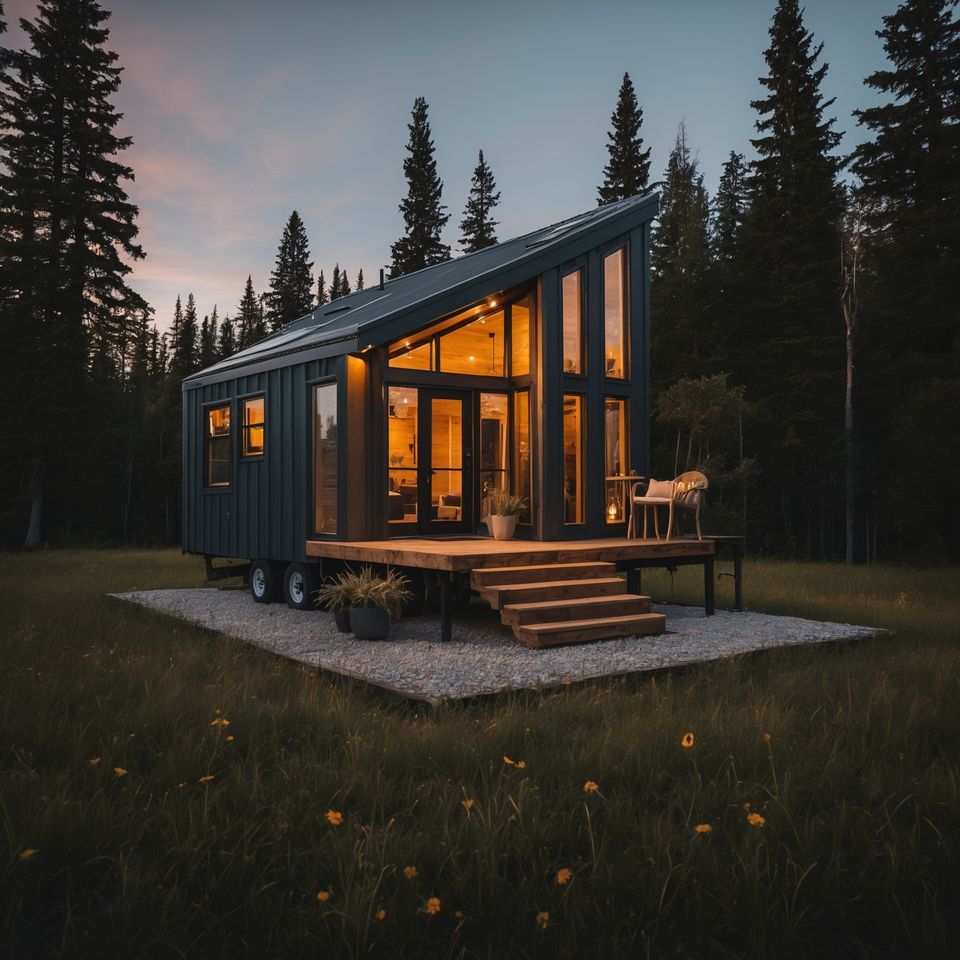
Trailer Tiny Homes
Introduction and Benefits
Trailer tiny homes, a significant and versatile segment of the tiny house movement, redefine traditional homeownership by merging mobility with modern living. These homes are built on trailers and they can be hitched to a vehicle and moved to different locations, offering a unique blend of stability and flexibility.
What Are Trailer Tiny Homes?
They are fully functioning residences constructed on a trailer base, often conforming to the size limitations of a road-legal vehicle to ensure they can be towed. Ranging from 100 to 400 square feet, these homes are designed to maximize every inch of space, incorporating living areas, kitchens, bathrooms, and sleeping quarters into a compact efficient layout. The mobility of these homes is appealing to those who desire a nomadic lifestyle or simply want the freedom to relocate without the need to sell their home.
Why Choose a Trailer Tiny Home?
Choosing a trailer tiny home is about embracing freedom, flexibility, and a simpler way of life. These homes allow owners to explore new locations while offering a minimalist lifestyle, reducing living costs and environmental impact. The ability to customize your home on wheels and take it wherever you go appeals to a wide range of individuals, from remote workers and adventure-seekers, to retirees looking to downsize.
A Growing Trend
The popularity of trailer tiny homes continues to surge as more people seek alternatives to traditional housing and strive to live a more financially free lifestyle. These homes offer a practical solution to housing affordability while providing an exciting way to live sustainably.
The various beneficial aspects of trailer tiny homes, from their design and customization to living on the go, make it clear why so many people are turning to this housing option as a way to reclaim their independence.
Benefits of Trailer Tiny Homes
Trailer tiny homes offer a unique blend of benefits that cater to those looking for freedom, efficiency, and a sustainable lifestyle. Here are some of the key advantages:
Mobility and Flexibility
The most striking benefit of a trailer tiny home is its mobility. Owners enjoy the freedom to move their home wherever and whenever they choose, whether following job opportunities, seeking adventure, or simply changing their scenery. Unlike traditional RVs or campers, trailer tiny homes are built with long-term living in mind, providing all the comforts of a permanent home.
Cost-Effectiveness
Trailer tiny homes are less expensive than traditional homes. This affordability extends not just to the initial purchase price but also to ongoing expenses such as taxes, maintenance, and utilities. The smaller space encourages a simpler lifestyle with less consumption and waste, translating into lower monthly expenses.
Eco-Friendly Living
These homes require fewer building materials and consume less energy, which reduces their environmental impact. Owners often equip their homes with eco-friendly features like solar panels, composting toilets, and greywater systems, enhancing the sustainability.
Simplified Lifestyle
Living in a tiny space encourages minimizing possessions and decluttering, leading to a less complicated and more focused lifestyle. Many trailer tiny home owners become part of vibrant communities of like-minded individuals who value sustainability, simplicity, and flexibility.
Customization and Personalization
Trailer tiny homes can be customized to reflect the owner’s tastes and needs, from sleek designs to cozy interiors. Designing and building a trailer tiny home offers creative involvement that is often not possible with traditional housing.
Enhanced Privacy
Unlike apartments or condos, a trailer tiny home offers the privacy of owning your home without shared walls or communal living. You can choose to park in secluded areas or join communities, depending on your preference for privacy or social interaction.
These benefits make trailer tiny homes a popular choice for those looking to optimize their quality of life through mobility, cost savings, and sustainable living, all while maintaining the comforts of a traditional home.
Design and Customization
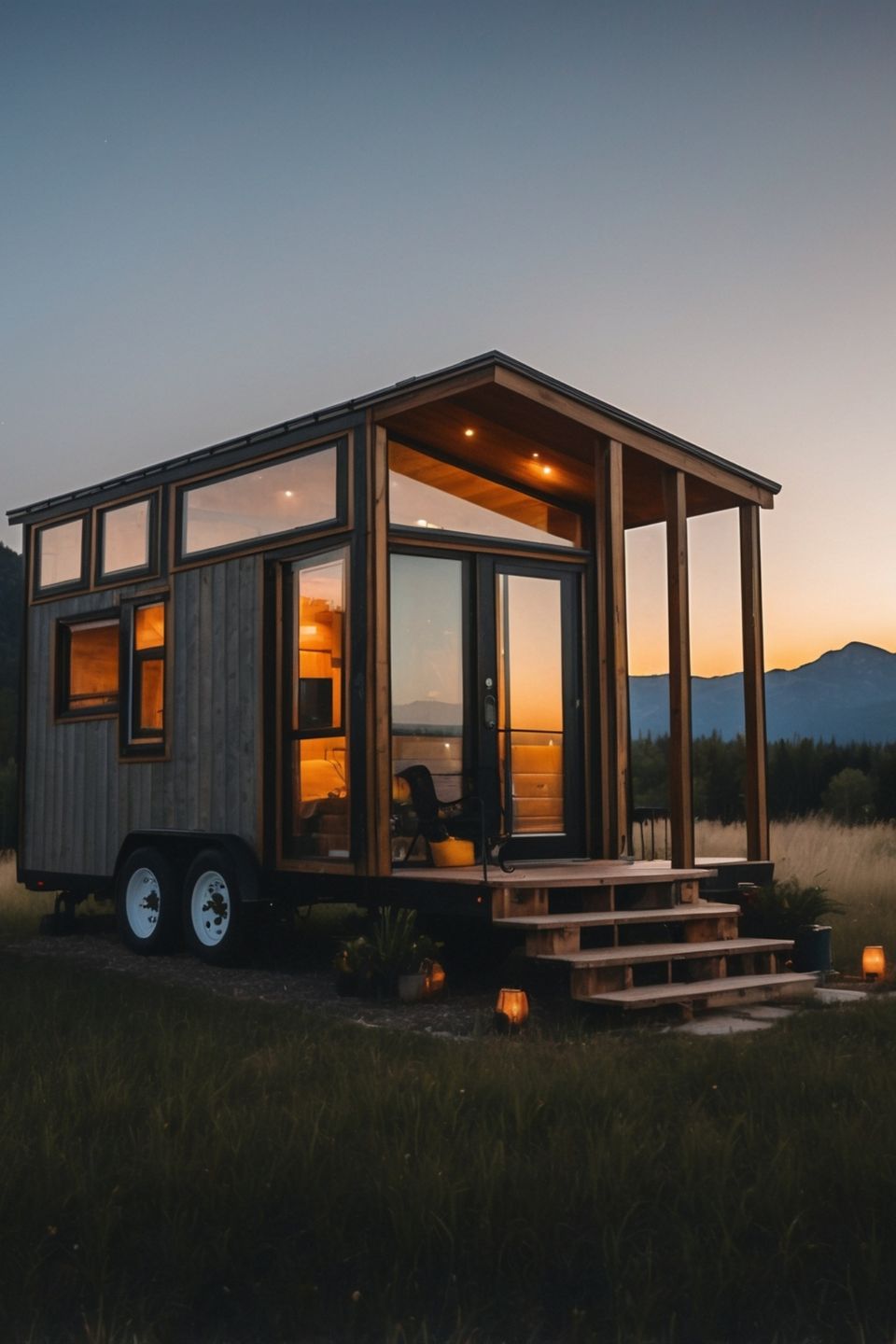
Design and Customization
Trailer Tiny Homes
Flexible Layouts
Whether you prefer an open plan that maximizes space or distinct zones for privacy, trailer tiny homes can be designed with custom floor plans to suit your lifestyle. Options include using multipurpose furniture to optimize space usage. Many trailer tiny homes feature lofted areas for sleeping or storage, doubling the usable area within the same footprint.
Exterior Design
The exterior of a trailer tiny home can be clad in a variety of materials, from wood siding to metal panels, offering durability and style. Placement and size of windows and doors can be customized for optimal natural light and airflow, enhancing energy efficiency.
Interior Finishes
From rustic charm to contemporary sleekness, the interior of a trailer tiny home can reflect any design. Custom cabinets, countertops, and fixtures allow for complete control over the look of the interior. Built-in shelves, hidden compartments, and convertible furniture are popular choices that make living in a compact space more enjoyable.
Outdoor Integration
Many trailer tiny homes include design features like fold-out decks or retractable roofs, which extend the living space outdoors. These features allow homeowners to enjoy the environment around them more fully and make the most of their location.
These customization options ensure that each trailer tiny home is not only a reflection of the owner’s needs and style but also a fully functional and optimized living space. The possibilities are vast, allowing for limitless personalization that makes each tiny home unique.
Sustainability and Eco-Friendlinesss
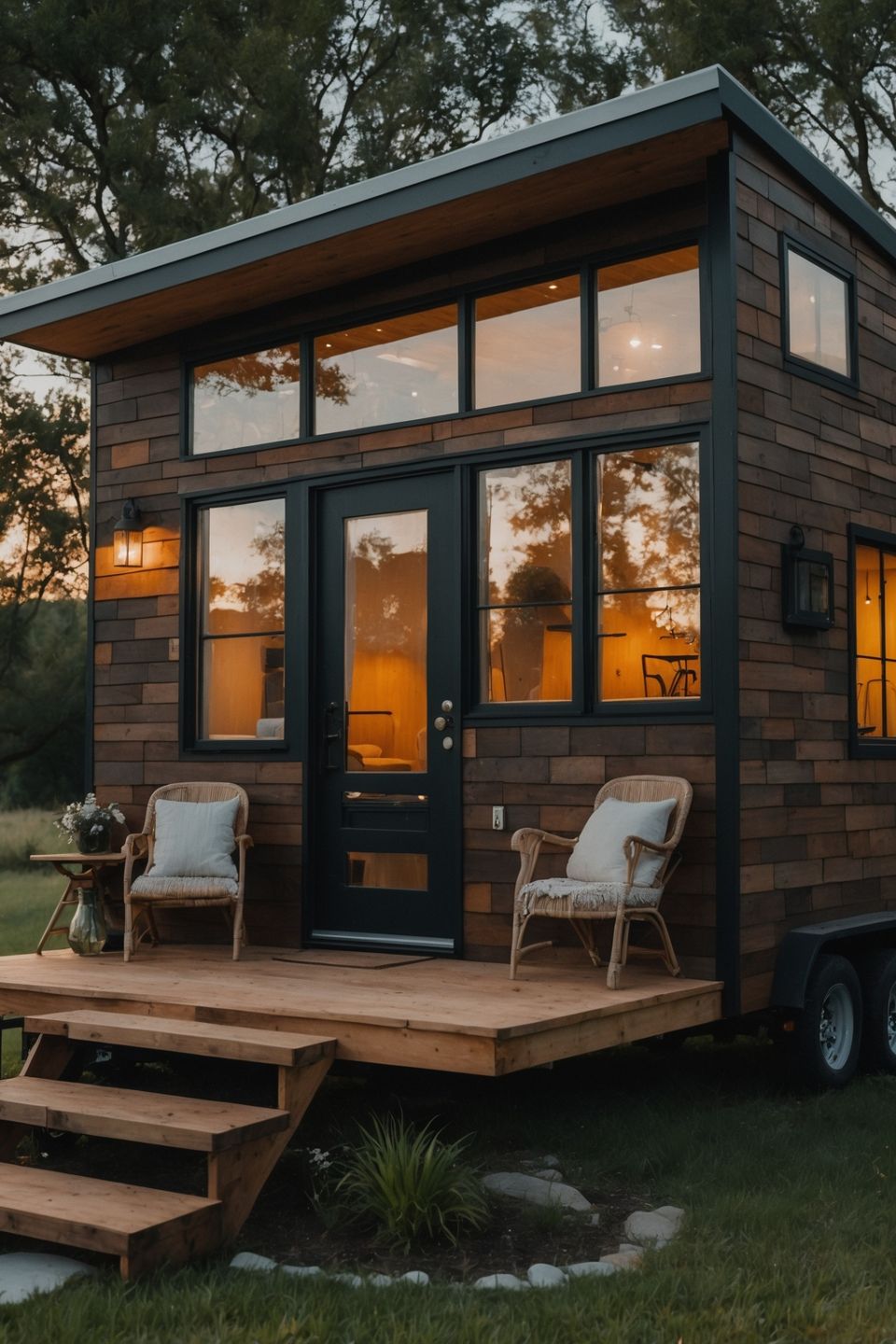
Sustainability
and Eco-Friendliness
Efficient Use of Materials
Many trailer tiny homes are built using sustainable or recycled materials, including reclaimed wood, recycled metal, and low-VOC (volatile organic compounds) paints and sealants. These choices help reduce the home’s environmental footprint.
Energy Conservation
The small size of trailer tiny homes naturally leads to lower energy consumption for heating, cooling, and lighting. Many homeowners enhance this benefit by installing high-efficiency appliances and LED lighting.
Renewable Energy
Solar panels are a common feature in trailer tiny homes, providing a clean, renewable source of energy that can power the entire home. Some homeowners also opt for wind turbines or solar water heating systems to decrease their reliance on non-renewable energy sources.
Water Efficiency
Rainwater harvesting systems and greywater recycling are popular in trailer tiny homes, allowing homeowners to reuse water for toilets, gardening, and bathing. Water-saving fixtures further reduce the footprint.
Less Consumption
The limited space in trailer tiny homes encourages a minimalist lifestyle, reducing unnecessary possessions and consumption of goods. This clears physical and mental clutter, reduces waste, and promotes a more thoughtful way of living.
The adaptability and innovative design of these homes make them ideal for eco-minded individuals looking to make a significant positive environmental impact.
Maintenance and Upkeep
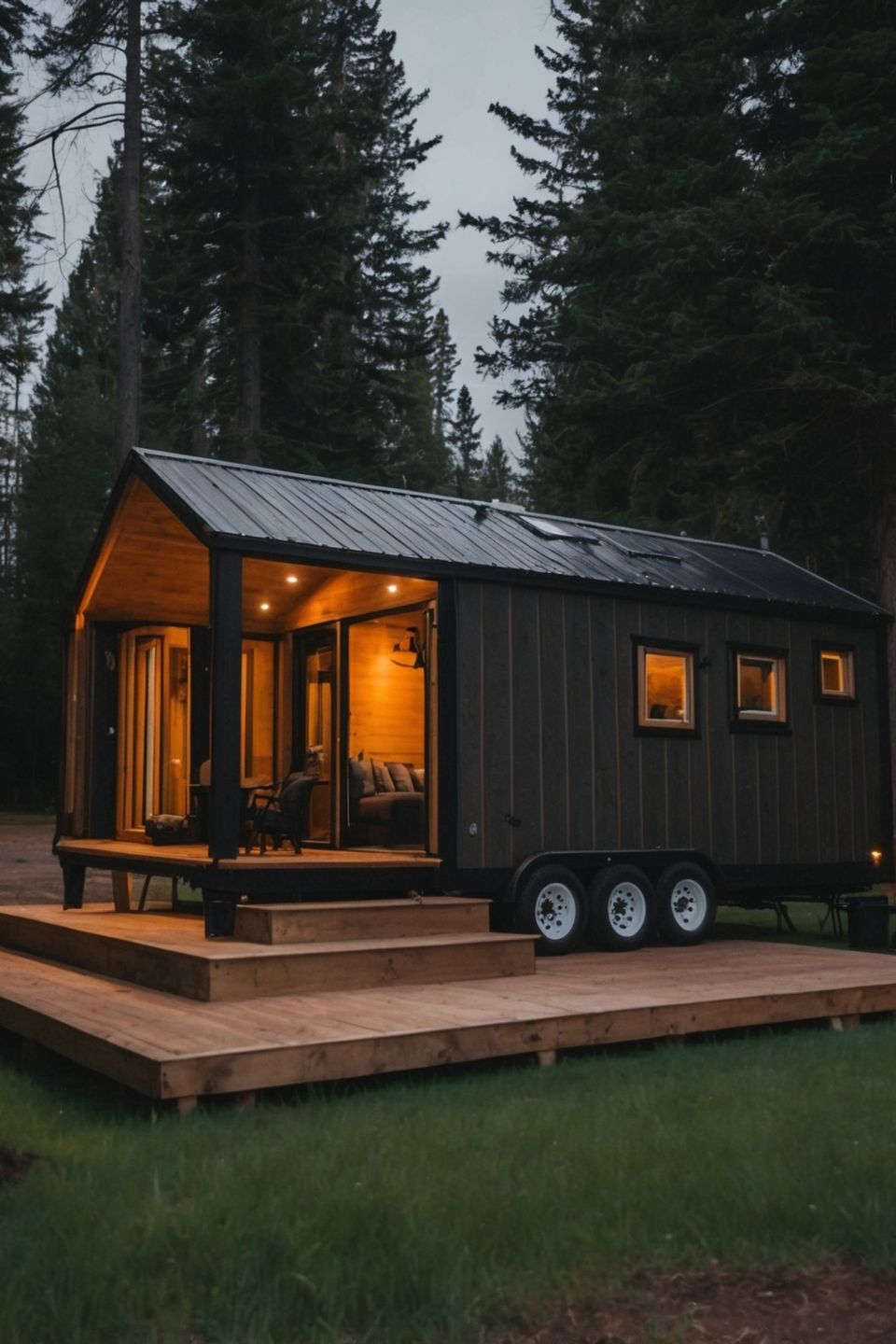
Trailer Tiny Home
Maintenance and Upkeep
Structural Integrity Checks
Periodically inspect the structural integrity of the trailer, including the chassis and hitching mechanism, especially if the home is moved frequently. Look for signs of wear, rust, or damage that could compromise safety.
Sealant and Waterproofing
Check the exterior sealants around windows, doors, and joints at least twice a year. Reapply caulking and sealants as necessary to prevent leaks and protect against water damage.
Mobility Maintenance
Regularly check the tires for wear and pressure, especially before any major relocation. This includes ensuring they are properly inflated and replacing them when the tread gets worn down.
Ventilation Systems
Maintain good air quality and moisture control by cleaning or replacing ventilation filters and ensuring that air vents are not obstructed.
Exterior Care
Regularly wash the exterior of the home to prevent buildup of dirt and debris that can lead to rust or decay. Consider a protective paint or coating to help shield the exterior from the elements. Keep the roof clean and free from debris, particularly if the home is parked under trees. Regularly check and repair any damage to roofing materials.
Building Process And Regulations
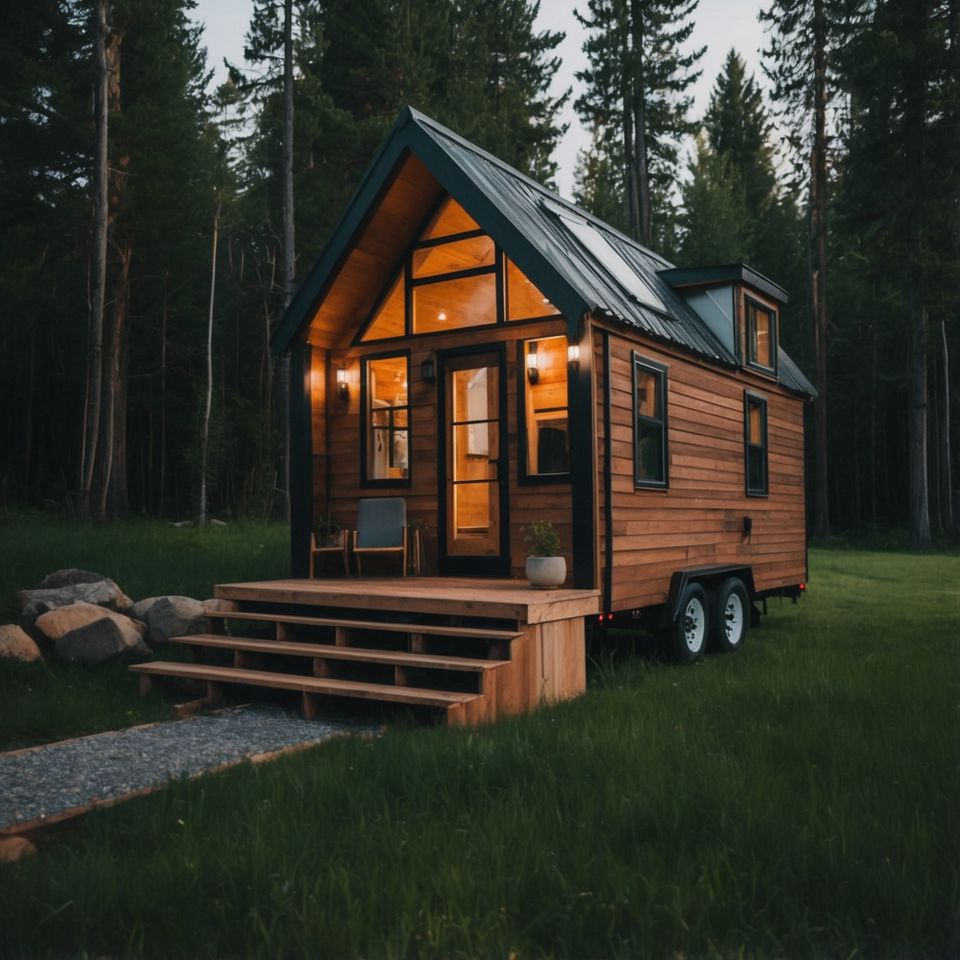
Building Process
And Regulations
Start with framing your tiny home using lightweight yet durable materials. Consider the dynamic forces the home will face while being towed, and use appropriate tie-downs and reinforcements.
Install electrical, plumbing, and HVAC systems. It is crucial to use certified professionals for this step to ensure that all installations comply with local codes and are safe for mobile use.
Properly insulate the walls, floor, and ceiling to protect against weather extremes and to enhance energy efficiency. Follow with interior finishes, custom cabinetry, and the installation of fixtures and appliances.
Regulations and Legal Considerations
Check local zoning laws where you plan to park your tiny home. Some areas have specific codes regarding the minimum size of dwellings, while others may not recognize tiny homes on wheels as permanent residences.
While trailer tiny homes on wheels might not be subject to the same codes as permanent homes, they must comply with the standards set by the RV Industry Association (RVIA) or similar if they are to be considered RVs. For non-RV classification, look into alternative standards like the National Fire Protection Association (NFPA) codes.
Since a trailer tiny home is a vehicle, it must meet certain Department of Motor Vehicle (DMV) requirements to be road legal. This includes having proper lights, brakes, and other towing mechanisms compliant with federal and state regulations.
Inspections and Certifications
Depending on local laws and the classification of your tiny home (RV, mobile home, etc.), you may need to have the home inspected by a certified inspector. This could include electrical, plumbing, and overall safety inspections.
Obtaining certification from recognized bodies like the RVIA can facilitate easier placement in RV parks and can assist with insurance and financing.
Insurance and Financing
Securing insurance for a trailer tiny home can be challenging but is crucial. Insurance requirements and availability can vary significantly depending on whether the home is classified as an RV, mobile home, or custom-built trailer.
Financing a trailer tiny home can also be complicated. Traditional home loans are usually not applicable; instead, personal loans, RV loans, or manufacturer financing might be options, depending on the home’s classification and certification.
Getting a good grasp of the building process and regulations is key to the success of your trailer tiny home project. It ensures that your home fits your lifestyle and follows all legal standards for safety and sustainability.
FAQs About Trailer Tiny Homes
What is a trailer tiny home?
A trailer tiny home is a small, fully functional dwelling built on a trailer platform. It includes essential living areas like a kitchen, bathroom, and sleeping space, designed to be mobile and easily relocated.
Can I legally drive my trailer tiny home on public roads?
Yes, you can drive your trailer tiny home on public roads, but it must meet specific size and weight regulations to be road legal. Ensure it is properly registered and meets all Department of Motor Vehicle (DMV) requirements, including having the right lights, brakes, and towing gear.
How much does a trailer tiny home cost?
The cost of a trailer tiny home varies based on size, materials, and custom features. Generally, prices can range from $20,000 to $100,000 or more. Factors like the level of customization and the choice of appliances also affect the final price.
Are trailer tiny homes environmentally friendly?
Trailer tiny homes are considered environmentally friendly due to their small size, which naturally requires fewer materials and consumes less energy. Many owners choose sustainable materials and add eco-friendly features like solar panels and rainwater collection systems.
What are the main challenges of living in a trailer tiny home?
Common challenges include limited space, needing to declutter regularly, and managing legalities like zoning laws and building codes. Additionally, living in a mobile home requires regular maintenance to ensure everything functions properly when moving to new locations.
How do I find a place to park my trailer tiny home?
You can park your trailer tiny home in RV parks, tiny house communities, or on private land, depending on local regulations. Always check local zoning laws and community rules to ensure you can legally park your tiny home in the desired location.
Can I customize the interior of my trailer tiny home?
Trailer tiny homes are highly customizable. You can choose from various layouts, finishes, and fixtures to match your style and needs. Many people opt for multi-functional furniture and innovative storage solutions to make the most of the space.
How do I maintain my trailer tiny home?
Regular maintenance includes checking and maintaining the trailer’s structure, such as the tires and brakes, and caring for the home's exterior and interior. This might involve tasks like sealing leaks, repainting surfaces, and servicing appliances to keep everything in working order.
Is financing available for trailer tiny homes?
Financing options for trailer tiny homes can be limited but are available through some financial institutions. Options may include personal loans, RV loans, or manufacturer financing, depending on how the home is classified.
Can I live in a trailer tiny home with a family?
Families can live in a trailer tiny home, though the space is compact. Careful planning and design are crucial to ensure that the home meets the needs of each family member. Incorporating clever storage solutions and adaptable living areas can make family life more comfortable.
A trailer tiny home is a small, fully functional dwelling built on a trailer platform. It includes essential living areas like a kitchen, bathroom, and sleeping space, designed to be mobile and easily relocated.
Can I legally drive my trailer tiny home on public roads?
Yes, you can drive your trailer tiny home on public roads, but it must meet specific size and weight regulations to be road legal. Ensure it is properly registered and meets all Department of Motor Vehicle (DMV) requirements, including having the right lights, brakes, and towing gear.
How much does a trailer tiny home cost?
The cost of a trailer tiny home varies based on size, materials, and custom features. Generally, prices can range from $20,000 to $100,000 or more. Factors like the level of customization and the choice of appliances also affect the final price.
Are trailer tiny homes environmentally friendly?
Trailer tiny homes are considered environmentally friendly due to their small size, which naturally requires fewer materials and consumes less energy. Many owners choose sustainable materials and add eco-friendly features like solar panels and rainwater collection systems.
What are the main challenges of living in a trailer tiny home?
Common challenges include limited space, needing to declutter regularly, and managing legalities like zoning laws and building codes. Additionally, living in a mobile home requires regular maintenance to ensure everything functions properly when moving to new locations.
How do I find a place to park my trailer tiny home?
You can park your trailer tiny home in RV parks, tiny house communities, or on private land, depending on local regulations. Always check local zoning laws and community rules to ensure you can legally park your tiny home in the desired location.
Can I customize the interior of my trailer tiny home?
Trailer tiny homes are highly customizable. You can choose from various layouts, finishes, and fixtures to match your style and needs. Many people opt for multi-functional furniture and innovative storage solutions to make the most of the space.
How do I maintain my trailer tiny home?
Regular maintenance includes checking and maintaining the trailer’s structure, such as the tires and brakes, and caring for the home's exterior and interior. This might involve tasks like sealing leaks, repainting surfaces, and servicing appliances to keep everything in working order.
Is financing available for trailer tiny homes?
Financing options for trailer tiny homes can be limited but are available through some financial institutions. Options may include personal loans, RV loans, or manufacturer financing, depending on how the home is classified.
Can I live in a trailer tiny home with a family?
Families can live in a trailer tiny home, though the space is compact. Careful planning and design are crucial to ensure that the home meets the needs of each family member. Incorporating clever storage solutions and adaptable living areas can make family life more comfortable.
